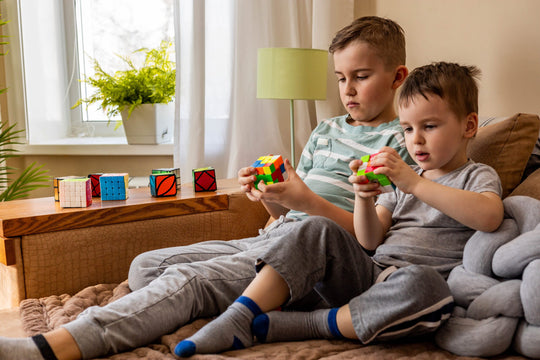1. Mechanical Puzzles
Think of the Rubik's Cube and those funky wooden games you see at Cracker Barrel. These types of puzzles are ideal for helping children:- Improve Pattern Recognition. Solving mechanical puzzles often requires examining patterns within the puzzle. Whether it is a repetitive motion or a pattern in the mechanics, children become keen observers of patterns as they solve these types of puzzles.
- Practice Patience. One thing that won’t help a child solve a mechanical puzzle is frustration. Through time spent engaging with mechanical puzzles, children learn to be patient and persistent if they want to solve the problem in front of them.
- Destress and Relax. In our busy and fast-paced world, teaching a child to take a solo break with a puzzle can help them learn the value of slowing down. Mechanical puzzles hold a child’s attention and help alleviate the usual bombardment of distractions.
2. Riddles & Word Puzzles
Remember playing hangman? Love a good race through a word search? Or get a good chuckle at silly riddles like Q: What has a bottom at the top? A: Your legs! Puzzles that use words like these examples are a great way for kids to:- Develop Critical Thinking Skills. With word puzzles like riddles and crosswords, children must carefully consider the information they’ve been given. Then through the use of logic and creativity, they work to find a solution. Every step of this process supports critical thinking—in a fun way!
- Enhance Communication Skills. Word puzzles help build vocabulary, practice spelling, and encourage the use of language to express thoughts and ideas. Word puzzles can also be a wonderful collaborative activity where kids are invited to work together to solve them.
- Improve Test Performance. Puzzles help children practice skills that support student performance during test-taking such as verbal reasoning, strategic thinking, and memory skills like recalling definitions. Practicing these skills with puzzles makes them more accessible when needed during tests.
3. Jigsaw Puzzles
Last but not least, the classic puzzle. Jigsaw puzzles may seem old-school, but they offer plenty of modern-day benefits for kiddos and adults alike. Puzzling this way can help kids:- Build Concentration. Putting together jigsaw puzzles requires focusing on one piece at a time while considering the puzzle as a whole. It also requires great attention to detail as children examine the visuals on each piece and their shape to see what fits where.
- Promote Faster Processing. The time it takes children to process information is known as processing speed. This is aided by puzzle play and analyzing multiple pieces in a short amount of time. That can translate into other mental tasks like solving math problems and analyzing multiple solutions.
- Boost Self-Esteem and Confidence. There’s nothing quite like putting the last piece of a jigsaw puzzle in and standing back to admire your masterpiece after all the hard work is done. The sense of accomplishment boosts confidence and empowers kids in other areas of life.
Know what else boosts problem-solving skills and confidence?
Accomplishing a baking project! Try one of our favorites like Valentine's Day Red Velvet Cupcakes!







